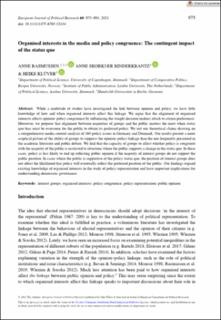| dc.contributor.author | Rasmussen, Anne | |
| dc.contributor.author | Binderkrantz, Anne Skorkjær | |
| dc.contributor.author | Klüver, Heike | |
| dc.date.accessioned | 2022-03-16T12:51:35Z | |
| dc.date.available | 2022-03-16T12:51:35Z | |
| dc.date.created | 2021-04-09T12:47:19Z | |
| dc.date.issued | 2021 | |
| dc.identifier.issn | 0304-4130 | |
| dc.identifier.uri | https://hdl.handle.net/11250/2985561 | |
| dc.description.abstract | While a multitude of studies have investigated the link between opinion and policy, we have little knowledge of how and when organised interests affect this linkage. We argue that the alignment of organised interests affects opinion–policy congruence by influencing the weight decision-makers attach to citizen preferences. Moreover, we propose that alignment between majorities of groups and the public matters the most when status quo bias must be overcome for the public to obtain its preferred policy. We test our theoretical claims drawing on a comprehensive media content analysis of 160 policy issues in Germany and Denmark. Our results present a more sceptical picture of the ability of groups to suppress the opinion–policy linkage than the one frequently presented in the academic literature and public debate. We find that the capacity of groups to affect whether policy is congruent with the majority of the public is restricted to situations where the public supports a change in the status quo. In these cases, policy is less likely to end up reflecting public opinion if the majority of interest groups do not support the public position. In cases where the public is supportive of the policy status quo, the position of interest groups does not affect the likelihood that policy will eventually reflect the preferred position of the public. Our findings expand existing knowledge of organised interests in the study of policy representation and have important implications for understanding democratic governance. | en_US |
| dc.language.iso | eng | en_US |
| dc.publisher | Wiley | en_US |
| dc.rights | Attribution-NonCommercial-NoDerivatives 4.0 Internasjonal | * |
| dc.rights.uri | http://creativecommons.org/licenses/by-nc-nd/4.0/deed.no | * |
| dc.title | Organised interests in the media and policy congruence: The contingent impact of the status quo | en_US |
| dc.type | Journal article | en_US |
| dc.type | Peer reviewed | en_US |
| dc.description.version | publishedVersion | en_US |
| dc.rights.holder | Copyright 2021 The Authors | en_US |
| cristin.ispublished | true | |
| cristin.fulltext | original | |
| cristin.qualitycode | 2 | |
| dc.identifier.doi | 10.1111/1475-6765.12434 | |
| dc.identifier.cristin | 1903210 | |
| dc.source.journal | European Journal of Political Research | en_US |
| dc.source.pagenumber | 975-993 | en_US |
| dc.identifier.citation | European Journal of Political Research. 2021, 60 (4), 975-993. | en_US |
| dc.source.volume | 60 | en_US |
| dc.source.issue | 4 | en_US |

